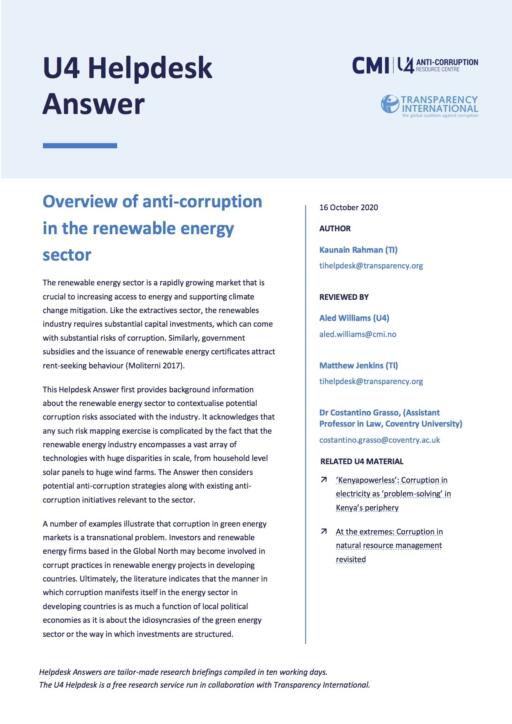
This Anti-Corruption Helpdesk brief was produced in response to a query from a U4 Partner Agency. The U4 Helpdesk is operated by Transparency International in collaboration with the U4 Anti-Corruption Resource Centre based at the Chr. Michelsen Institute.
Query
Please provide an overview of anti-corruption initiatives in the renewable energy sector.
Summary
The renewable energy sector is a rapidly growing market that is crucial to increasing access to energy and supporting climate change mitigation. Like the extractives sector, the renewables industry requires substantial capital investments, which can come with substantial risks of corruption. Similarly, government subsidies and the issuance of renewable energy certificates attract rent-seeking behaviour (Moliterni 2017).
This Helpdesk Answer first provides background information about the renewable energy sector to contextualise potential corruption risks associated with the industry. It acknowledges that any such risk mapping exercise is complicated by the fact that the renewable energy industry encompasses a vast array of technologies with huge disparities in scale, from household level solar panels to huge wind farms. The Answer then considers potential anti-corruption strategies along with existing anti-corruption initiatives relevant to the sector.
A number of examples illustrate that corruption in green energy markets is a transnational problem. Investors and renewable energy firms based in the Global North may become involved in corrupt practices in renewable energy projects in developing countries. Ultimately, the literature indicates that the manner in which corruption manifests itself in the energy sector in developing countries is as much a function of local political economies as it is about the idiosyncrasies of the green energy sector or the way in which investments are structured.
Contents
- Background
- Potential forms of corruption in the sector
- Anti-corruption strategies
- Examples of existing good governance initiatives in the renewables sector
- References
Main points
- The development of renewable energy markets poses a set of unique corruption challenges, especially in the African context. Experiences from the extractives sector have led some in the industry to warn of a potential “green curse”.
- Stakeholders in renewable energy value chains include not only manufacturers, suppliers and users but also government agencies, financial institutions and private technology companies, as well as informal local networks.
- Potential forms of corruption include bribery, theft, collusion and bid-rigging.
- Anti-corruption strategies designed for the sector should be cognisant that local contextual realities are as important as the industry-specific idiosyncrasies of the green energy sector.
Authors
Kaunain Rahman (TI), [email protected]
Reviewers
Aled Williams (U4), [email protected]
Matthew Jenkins (TI), [email protected]
Dr Costantino Grasso (Assistant Professor in Law, Coventry University), [email protected]
Date
02/11/2020

